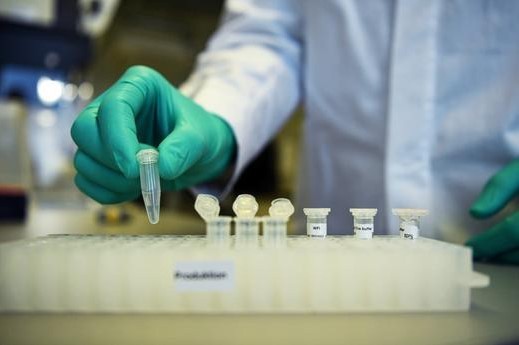Coronavirus: The Race For A Cure

All eyes are turned to the prospect of a coronavirus vaccine after the World Health Organization declared the disease a pandemic on March 11.
Various drugmakers and research organizations across the globe are rushing to roll out a vaccine in a bid to stop the spreading and cure the ill.
According to a news article, four out of 35 companies have candidates ready for human trials. Moderna Therapeutics, a Boston-based biotech firm, will reportedly enter trials in April.
The first vials, which were created 42 days after Chinese researchers released COVID-19's genetic sequence, were shipped to the National Institute of Allergy and Infectious Disease (NIAID) which will oversee the human trials.
Research groups credit the early head start on their understanding of previous coronaviruses and the vaccines developed for them.
Read: Important Facts You Should Know About the Global Pandemic Coronavirus
Coronaviruses such as the severe acute respiratory syndrome (SARS) and the Middle East respiratory syndrome (MERS) both saw vaccines fully developed, but were shelved when the outbreaks were successfully contained.
A research company in Maryland, Novavax, has repurposed the vaccines for COVID-19. Moderna built their Sars-CoV-2 vaccine from earlier work on the Mers virus.
Clinical Trial
The trial, which is necessary for regulatory approval, usually involves three phases.
The first phase will see healthy volunteers injected with the vaccine. Researchers will be observing the candidates for any possible adverse effects of the newly-developed drug.
The second part of the trial will involve hundreds of people who were living in a place affected by the coronavirus. At this stage, scientists will monitor the drug's effectiveness.
The last phase of the trial will involve thousands of people and will replicate the steps taken in the second stage.
Bruce Gellin from the Sabin Vaccine Institute says not all candidates who were present for the first part of the trial will see it to the finish line.
Other Treatment Options
Robert Kruse, a doctor at John Hopkins Hospital, is pursuing two different treatment options.
One possible treatment, which could be available in weeks, involves using antibodies from patients who've fully recovered from the coronavirus. As of Sunday, there were over 76,618 patients who have seen a full recovery from the disease.
He also proposed developing a "decoy cell" to which the virus could latch onto and prevent it from spreading throughout the human body. The therapy would not be available until fall. China is holding trials for a similar version of the strategy.
Read: How to Find Out if You are Positive for the Novel Coronavirus
A team of scientists in Canada has successfully isolated and replicated copies of the coronavirus on Friday, March 13. The success brings the world a step closer to developing a vaccine against the global health threat.
Various scientists from research institutions in Canada have successfully developed copies of COVID-19 from samples taken from two patients. The copies will help in developing treatments and a better understanding of the pathogen's biology.
"Now that we have isolated the SARS-CoV-2 virus the agent responsible for COVID-19, we can share this with other researchers and continue this teamwork," Dr. Arinjay Banerjee, a post-doctoral fellow from McMaster University, said.
Chinese health officials said eight local institutions are working on different approaches to combat coronavirus and are expecting to start clinical trials next month.
Subscribe to Latin Post!
Sign up for our free newsletter for the Latest coverage!

















